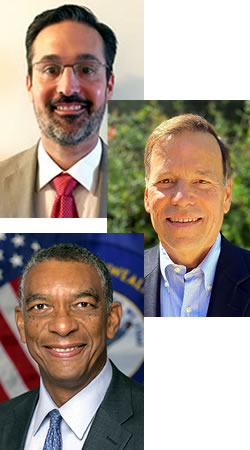Op-Ed: Affordability a shared goal since higher education matters – for everyone
September 07, 2021
By Kentucky Council on Postsecondary Chair Lucas Mentzer, Vice-Chair Eric Farris and President Aaron Thompson

It’s been truly inspiring to see young students from across the Commonwealth step up to the microphone in the Capitol rotunda and express their thoughts on what a full scholarship to one of Kentucky’s public colleges or universities means to them. The scholarships, which are being awarded to 15 students ages 12 to 17, are a part of Gov. Andy Beshear’s vaccine incentive program to encourage Kentuckians to get vaccinated against COVID-19.
We’re very appreciative that the governor included the scholarships in his “Shot at a Million” program. The awards allow these promising youth to follow -- and afford -- their dreams of a college degree.
But students who don’t win this scholarship still have a shot at a million, although of a different sort. An investment in a bachelor’s degree will likely earn you $1 million more over the course of your career. According to the American Community Survey, the median lifetime earnings for bachelor’s degree holders in Kentucky is $2.5 million, compared to just $1.5 million for high school graduates.
And for those whose college goal includes a short-term credential or associate degree, there’s a substantial boost in median lifetime earnings in your future, too. That college experience will likely increase your lifetime earnings by $200,000.
Beyond increased earnings potential, higher education matters in other life-changing ways. The data show that those with higher education credentials have higher rates of job satisfaction and better health outcomes They are less likely to be unemployed, on public assistance or incarcerated. Additionally, the state reaps the benefits of a more highly skilled workforce to drive Kentucky’s economy.

For these reasons and more, the Council on Postsecondary Education is committed to ensuring that higher education is affordable for all Kentuckians. Last year, CPE approved a historically low average tuition increase of just 0.7% across the system. For the coming academic year, the average system-wide tuition increase is 1.2%.
We are also laser-focused on reducing other financial barriers to college for students from all backgrounds, with a special focus on historically underserved populations. Guided by our strategic agenda, campuses are making considerable progress with high-impact strategies to close equity gaps for underrepresented minority (URM) populations. Our recent progress report showed graduation rates and degrees conferred are at historic highs for URM students at public universities and KCTCS.
But there’s more we can do to lower the cost of college, and we need your help!
- Students – Fill out your FAFSA application to see if you qualify for free money for college. Talk to your counselor and parents for guidance about your college options, and don’t be afraid to ask for help. You can always reach out to the Kentucky Higher Education Assistance Authority outreach counselors since they provide services in every county.
- Parents/Mentors -- Check out a new resource, the Kentucky Students’ Right to Know website, to compare the cost of college at Kentucky public campuses, explore job demand for different majors, salaries and more.
- Kentucky executive and legislative leaders – Keep making Kentucky higher education a priority in the budget process and continue to move us toward healthier funding levels. Thank you for the recent addition of $38 million for pensions and performance funds. However, in nominal dollars since fiscal year 2008, the campuses have lost $178 million in funding. In inflation-adjusted dollars, that’s over $500 million, and it’s almost 40% less on a per-student, inflation-adjusted basis.
We will roll out a new strategic agenda in November that addresses affordability and equity issues in innovative and collaborative ways. Our goal is to ensure that all Kentuckians have a place in higher education if they want it. At CPE, we believe that higher education matters -- for everyone.
Last Updated: 9/26/2021
